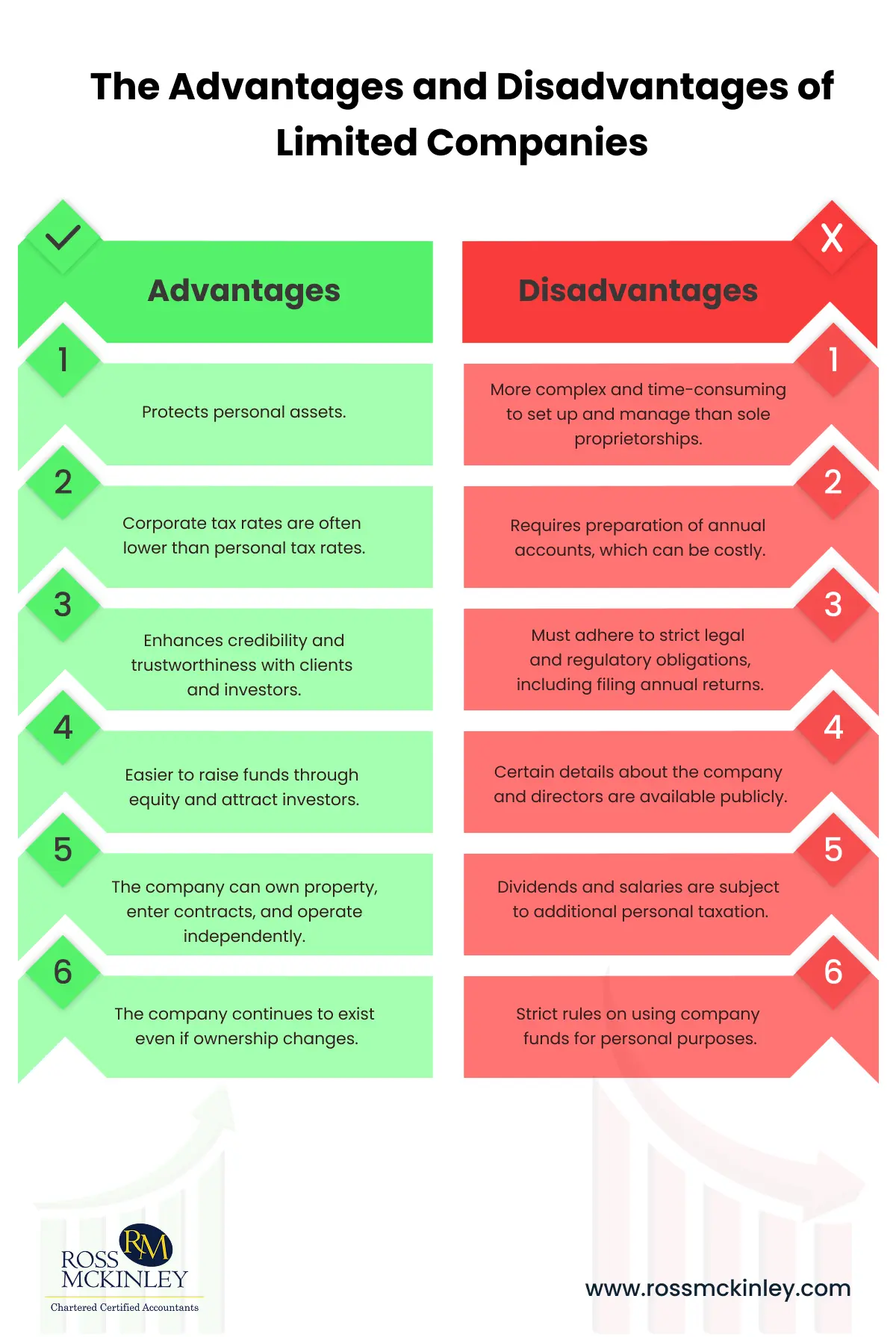
The Benefits of Outsourced Accounting
January 27, 2025
VAT on Services to Overseas Customers
January 29, 2025The Advantages and Disadvantages of Limited Companies

Starting a business is an exciting journey, but choosing the right structure is crucial for success. For many entrepreneurs, a limited company offers the perfect blend of professionalism, tax efficiency, and legal protection.
However, it’s not without its challenges. From the allure of limited liability to the complexities of compliance, running a limited company can be both rewarding and demanding.
In this article, we’ll unravel the advantages and disadvantages of this business model, helping you decide if it’s the right fit for your goals.

Table of Contents
Advantages of a Limited Company
A limited company is a distinct legal entity formed to conduct business, separate from its owners and directors. This structure offers the advantage of limited liability, meaning shareholders are only responsible for the company’s debts up to the value of their shares.
Limited companies can be privately owned (private limited companies) or publicly traded (public limited companies). Ownership is typically divided into shares, which represent a portion of the company and can be bought, sold, or transferred. Shareholders own the company, while directors manage its operations.
They enhance professional credibility, simplify access to investment opportunities, and create a distinct legal identity that ensures continuity even with changes in ownership. Let’s have a look at the few advantages of being a limited company.
| Advantages | Disadvantages |
| Protects personal assets. | More complex and time-consuming to set up and manage than sole proprietorships. |
| Corporate tax rates are often lower than personal tax rates. | Requires preparation of annual accounts, which can be costly. |
| Enhances credibility and trustworthiness with clients and investors. | Must adhere to strict legal and regulatory obligations, including filing annual returns. |
| Easier to raise funds through equity and attract investors. | Certain details about the company and directors are available publicly. |
| The company can own property, enter contracts, and operate independently. | Dividends and salaries are subject to additional personal taxation. |
| The company continues to exist even if ownership changes. | Strict rules on using company funds for personal purposes. |
1. Limited Liability Protection
A significant advantage of a limited company is that it separates the owners’ finances from the business. Shareholders are only liable for the value of their shares, ensuring personal assets remain protected if the company faces financial difficulties.
2. Tax Efficiency
Limited companies pay corporation tax on their profits. As of 2024/25, the main rate of corporation tax is 25% for profits over £250,000, and a small profits rate of 19% applies to profits under £50,000. Profits between these thresholds are taxed on a sliding scale.
Shareholders can receive dividends, which are taxed at lower rates compared to income tax. Dividend tax rates for the 2024/25 tax year are:
- 8.75% for basic-rate taxpayers
- 33.75% for higher-rate taxpayers
- 39.35% for additional rate taxpayers
This structure often results in a lower overall tax burden compared to sole traders who pay income tax rates of up to 45% on profits.
3. Professional Image
Operating as a limited company enhances credibility and trust with customers, suppliers, and potential investors. It signals a more established and professional business structure.
4. Separate Legal Identity
A limited company is a separate legal entity, allowing it to own property, enter contracts, and sue or be sued in its name. This structure provides continuity and security for the business.
5. Attracting Investment
Limited companies can issue shares to raise capital, making them an attractive option for investors. This is not an option for sole traders or partnerships.
6. Pension Contributions
Limited companies can make tax-efficient pension contributions on behalf of their employees and directors. These contributions are deductible as a business expense, reducing taxable profits.
7. Ownership Transferability
Shares in a limited company can be sold or transferred, making it easier to bring in new investors or exit the business compared to a sole proprietorship or partnership.
Disadvantages of a Limited Company
While limited companies offer significant benefits, they also come with challenges, such as administrative burdens, incorporation costs, and complex tax planning. Additionally, public financial disclosure and compliance requirements may deter some entrepreneurs.
Careful consideration is crucial to determine if a limited company structure aligns with your business goals. You might want to have a look at the following points before deciding on whether you want your business to be a limited company:
1. Administrative Responsibilities
Running a limited company involves more legal and financial responsibilities compared to sole traders or partnerships. Directors must comply with the Companies Act 2006 and file:
- Annual accounts with Companies House
- A confirmation statement
- A corporation tax return with HMRC
2. Costs of Incorporation and Maintenance
The process of setting up a limited company involves costs, including registration fees and potentially hiring accountants or legal professionals. Ongoing costs include preparing and filing statutory accounts and annual returns.
3. Public Disclosure
A limited company must publicly disclose certain information, including:
- Names of directors and shareholders
- Financial accounts
Well, This lack of privacy can be a concern for some business owners.
4. Less Flexibility in Profit Distribution
Unlike sole traders who can freely withdraw profits, limited company owners must decide how to allocate profits between salaries, dividends, and retained earnings. Dividends can only be paid from post-tax profits, limiting flexibility.
5. Taxation Complexity
While tax efficiency is an advantage, the tax regime for limited companies is more complex than for sole traders. Directors and shareholders must manage:
- Corporation tax
- Personal tax on dividends and salaries
- National Insurance contributions (NICs)
The dual-layer taxation can be challenging to navigate without professional advice.
6. Risk of Over-Dividending
If dividends are paid without sufficient profits, directors may face legal issues and have to repay the overdrawn amounts. This can jeopardize personal finances if not carefully managed.
7. Dissolution Challenges
Closing a limited company is more complicated and time-consuming than ending a sole proprietorship. Dissolution requires formal procedures, including notifying Companies House and settling all liabilities.
Conclusion
A limited company offers numerous benefits, including limited liability, tax efficiency, and an enhanced professional image, making it an attractive choice for many entrepreneurs. However, these advantages come with administrative responsibilities, public disclosure requirements, and potential tax complexities.
Careful consideration of your business’s needs, financial goals, and growth plans is essential when deciding whether to operate as a limited company. Consulting with a tax advisor or financial professional can help you navigate the decision and optimize your business structure for success.
By understanding the pros and cons, you can make an informed choice that aligns with your business aspirations.
